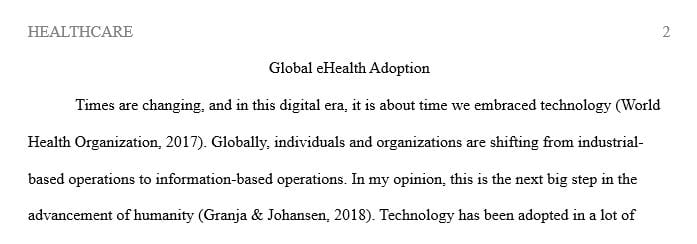Healthcare initiatives continue to evolve with the intention of including innovative platforms to drive connection between patients and providers.
Alexa
Global eHealth Adoption
In today’s global society, healthcare initiatives continue to evolve with the intention of including innovative platforms to drive connection between patients and providers. The World Health Organization (WHO) recognizes eHealth as a way to “effectively and efficiently improve the health of individuals, families, and communities” (Nelson & Staggers, 2018, p. 577). With these intentions, the World Health Organization (WHO) continues to be a driving force in managing the standards of technological application and consideration amongst various stakeholders.
Required Health Informatics Skills
In the United States, eHealth expansion has raised question to the required skillsets of healthcare professionals. For example, one of the leading challenges “are the lack of technological resources and the lack of appropriate materials for patients who may have low levels of reading, health and/or digital literacy” (DeMonte & Thorn, 2015, p. 207). Undoubtedly, as healthcare management and the practice informatics continues to evolve, so will the requirements for informatics professionals to effectively manage and maintain the progressive future study, including the study of data integrity and in addition, apply the skills and knowledge to the healthcare industry on a global scale. Nelson & Staggers (2018), make the case that supports defining healthcare informatics as a specialty. “Many disciplines solved this problem by combining the name of their field of practice with the word informatics” (p.605). The concerns with the approach is the lack of labor capabilities or at times referenced as the scope of work or practice. In light of this, it is reasonable to conclude the collaborative effort to combine information technology and medical practice skills together to help shape and further strengthen the future of healthcare delivery across the world. Fortunately, organizations such as the American Medical Informatics Association (AMIA) have started to develop a connection between healthcare professionals and the information technology professionals. This has and will continue to be a critical element to the successful adoption of digital connections amongst healthcare systems, their providers, and patients.
Current Obstacles and Overcoming Them
In Europe, specifically the United Kingdom, a study was conducted that highlighted the educational requirements of physicians across all medical disciplines. The study concluded “post graduate medical education in the UK neglects health information (HI) competencies set out by international standards” (Jidkov et al., 2019, p. 1). This further strengthens the gap between the evolving healthcare management landscape and the skillsets needed to embrace the new digital age. Most recently, the coronavirus pandemic has forced the hand of many new innovative technologies including electronic health records and telehealth medicine. With any new change comes obstacles to overcome including the increased amount of data for healthcare organizations to efficiently manage.
The time has come to change the scope of medical practice to embrace the technological and informatics landscape coupled with medical research. Combined, the world will continue to develop ways to connect and inform the right information to the right audience. In return, the long term benefit will be utilizing the data to continue to research and educate the future of individuals inspired to enter the global healthcare management space. First, there must be an emphasis on training initiatives such as accurate data entry and top to bottom adoption of electronic health records (EHR).
Biblical Integration
In the Bible, a verse from Matthew 28 highlights the importance of honoring disciples of all nations. In order to develop and create a healthcare system that caters to the development and support of all, nations across the globe must unite together to develop the links that connect the world to innovative processes and procedures. “Go therefore and make disciples of all nations, baptizing them in the name of the Father and of the Son and of the Holy Spirit, teaching them to observe all that I have commanded you. And behold, I am with you always, to the end of the age.” (Matthew, 28:19-20, English Standard Version). By adopting these initiatives, a healthcare organization is showing supporting desire to improve patient health quality and outcomes. Once the data accuracy is improved, the more confident healthcare professionals can be in delivering remarkable healthcare.
References
DeMonte, C. M., DeMonte, W. D., & Thorn, B. E. (2015). Future implications of eHealth
interventions for chronic pain management in underserved populations. Pain Management, 5(3), 207-214. doi:10.2217/pmt.15.9
English Standard Version Bible. (2001). ESV Online. https://esv.literalword.com/
Jidkov, L., Alexander, M., Bark, P., Williams, J. G., Kay, J., Taylor, P., Banerjee, A. (2019).
Health informatics competencies in postgraduate medical education and training in the UK: A mixed methods study. BMJ Open, 9(3), e025460. doi:10.1136/bmjopen-2018-025460
Nelson, R.& Staggers, N. (2018). Health informatics: An interprofessional approach. 2nd
Edition. Elservier Inc. St. Louis, Missouri
Answer preview to healthcare initiatives continue to evolve with the intention of including innovative platforms to drive connection between patients and providers.
APA
583 words



